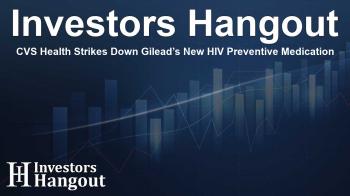CVS Health Strikes Down Gilead’s New HIV Preventive Medication

CVS Health's Decision on HIV Prevention Drug
CVS Health Inc. has announced a significant decision regarding the new HIV prevention drug from Gilead Sciences Inc. Known as Yeztugo, this treatment will not be incorporated into CVS's commercial plans. This news comes as health care providers and insurers grapple with the costs and accessibility of new treatments.
Yeztugo: Understanding the Drug
Yeztugo, scientifically referred to as lenacapavir, was officially approved to serve as pre-exposure prophylaxis (PrEP) by the U.S. Food and Drug Administration. It uniquely offers a twice-yearly injection option tailored for adults and adolescents weighing over 35 kilograms, representing a groundbreaking approach in HIV prevention. This makes it the first of its kind in the United States, addressing a crucial need for those considering PrEP options.
Impact of the Decision
CVS's explicit choice not to include Yeztugo in its Affordable Care Act formularies is grounded in various factors, including clinical trials, financial evaluations, and regulatory compliance. CVS's spokesperson, David Whitrap, articulated that these considerations played a pivotal role in their decision-making process.
HIV Prevention Recommendations
According to recommendations issued by the U.S. Preventive Services Task Force, which align with guidelines established by the U.S. Department of Health and Human Services (HHS), the current standard repertoire for HIV prevention consists of three primary medications. These include the generics Truvada and Descovy by Gilead, as well as an injectable drug called Apretude, produced in collaboration with Pfizer and GSK.
Addressing the Price Tag
Yeztugo carries a staggering price tag, with an annual list cost exceeding $28,000. This high cost has raised alarm among HIV advocates who view CVS Health's decision as a setback in tackling the ongoing challenges associated with HIV prevention.
Industry Reactions
Mitchell Warren, the executive director of AVAC, an organization dedicated to AIDS advocacy, expressed deep disappointment in CVS's decision, stating it represents a missed opportunity to enhance access to vital healthcare solutions. He emphasized the overarching challenge posed by exorbitant drug pricing in the U.S. health care system.
Outlook for Yeztugo
Despite CVS's refusal to adopt Yeztugo, Gilead remains optimistic about the drug's eventual acceptance across the broader insurance market. The company has forecast that approximately 75% of U.S. insurers will cover this new HIV prevention medication by the close of 2025, with hopes to achieve 90% coverage by mid-2026.
Cost-Effectiveness of Preventive Treatments
Gilead's CEO, Daniel O’Day, has noted the cost-effectiveness of preventative treatments, pointing out that managing the lifetime costs associated with an HIV infection can easily surpass $1 million. This comparison underscores the potential financial benefits of medication like Yeztugo.
Future Contributions to Market
Recent analyses have bolstered confidence surrounding Yeztugo, suggesting that its introduction could lead to significant contributions in sales for Gilead over the next few years. Analysts believe that the positive outlook from healthcare professionals may drive consumer demand.
CVS Health Under Scrutiny
The decision regarding Yeztugo surfaces amidst heightened scrutiny directed at CVS Health concerning its business practices. A recent federal ruling mandated that CVS's Caremark division pay approximately $290 million in penalties due to overcharging Medicare for various services.
Legal Challenges Ahead
This judgment stems from a prior case where another federal judge instructed CVS's Omnicare unit to disburse close to $949 million linked to a whistleblower claim over fraudulent billing practices. CVS is actively contesting these decisions, highlighting the ongoing legal challenges the company faces.
Stock Market Update
In terms of market performance, GILD shares experienced a dip of 2.71%, trading at around $115.51 during pre-market sessions. Concurrently, CVS's stock saw a slight decline, dropping 0.23% to settle at $70.65.
Frequently Asked Questions
1. What is Yeztugo?
Yeztugo is a new HIV prevention medication developed by Gilead, providing a twice-yearly injection option for individuals at risk for HIV.
2. Why did CVS decide not to include Yeztugo in its plans?
CVS’s decision was influenced by clinical, financial, and regulatory factors according to their spokesperson.
3. How much does Yeztugo cost?
Yeztugo has an annual list price of over $28,000.
4. What are the current recommendations for HIV prevention?
Current recommendations include generic Truvada, Gilead’s Descovy, and the injectable Apretude developed by Pfizer and GSK.
5. What actions is Gilead taking regarding Yeztugo's insurance coverage?
Gilead expects that 75% of U.S. insurers will cover Yeztugo by the end of 2025 and aims for 90% coverage by mid-2026.
About The Author
Contact Hannah Lewis privately here. Or send an email with ATTN: Hannah Lewis as the subject to contact@investorshangout.com.
About Investors Hangout
Investors Hangout is a leading online stock forum for financial discussion and learning, offering a wide range of free tools and resources. It draws in traders of all levels, who exchange market knowledge, investigate trading tactics, and keep an eye on industry developments in real time. Featuring financial articles, stock message boards, quotes, charts, company profiles, and live news updates. Through cooperative learning and a wealth of informational resources, it helps users from novices creating their first portfolios to experts honing their techniques. Join Investors Hangout today: https://investorshangout.com/
The content of this article is based on factual, publicly available information and does not represent legal, financial, or investment advice. Investors Hangout does not offer financial advice, and the author is not a licensed financial advisor. Consult a qualified advisor before making any financial or investment decisions based on this article. This article should not be considered advice to purchase, sell, or hold any securities or other investments. If any of the material provided here is inaccurate, please contact us for corrections.

